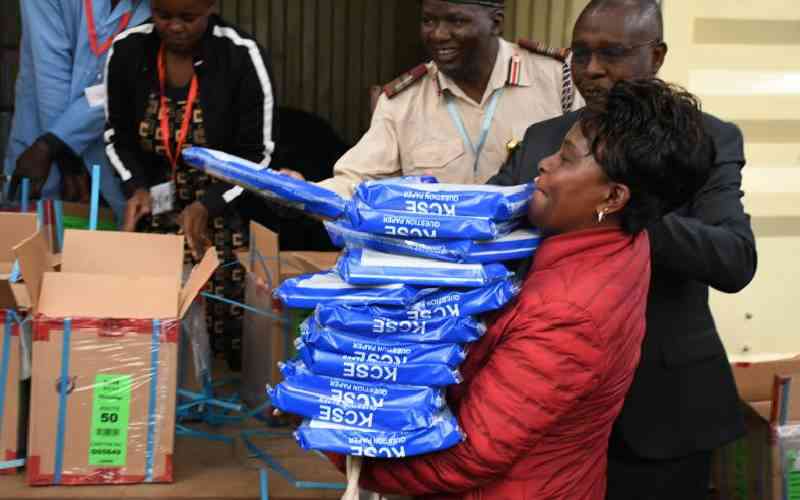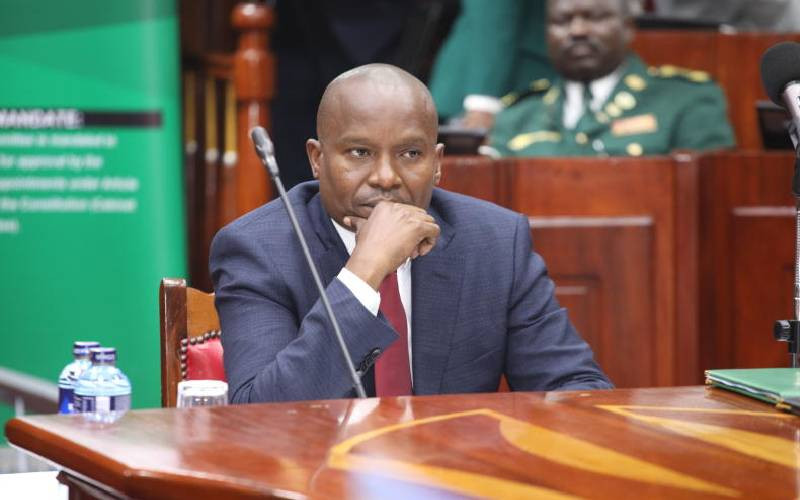In 2010, Robinson Mukhwana was lured by a friend to accompany him to Tanzania for a job.
Robinson never suspected his friend had other intentions and innocently accompanied him, and he only escaped murder for his body parts after being rescued by police in Tanzania whose awareness to such crimes had been heightened following gruesome killings in their country.
Since then, many cases of the abuse of people living with albinism have been reported, and more have gone unreported. And Kenya‘s role as a hub for trafficking is quickly coming under scrutiny from rights groups.
Data from a leading albino rights organisation‚ ‘Under The Same Sun (UTSS)’ indicates Kenya recorded 12 more attacks on people with albinism since Mukhwana‘s rescue; four of which led to death, the most recent attack being on March 15.
On this day, according to investigation by UTSS, a seven-year-old boy with albinism in Embu, Kenya escaped from relatives who tried to sell him for ritual purposes. He was kidnapped by his uncle together with other relatives who attempted to take off to an unknown destination where they were to meet the buyers.
The boy said the kidnappers threw him out of the window of a moving vehicle when he screamed.
In 2013, another case that ended which much less hope was reported. On the evening of Sunday March 4, 2012, Mrs Muzungu took her daughter Joyce Mbuchi to church for the evening prayers. The pastor was having individual prayers with his congregation and therefore he asked that all children be taken out of the church to play.
After the prayers, Mrs Muzungu could not find Joyce. She approached the pastor to inquire on her whereabouts. The pastor told her to be patient, keep praying and wait for Joyce by a rock outside the church.
The evening became darker and Mrs Muzungu went to the neighborhood looking for Joyce to no avail.
The following day, the pastor called her saying he had Joyce and they should meet on Thursday afternoon to reunite.
That Thursday afternoon villagers gathered at the church. Instead of the pastor coming, he sent his assistant, which provoked the villagers. The pastor sought police protection as the villagers burned down the church. To date, Joyce Mbuchi Muzungu has never been found. The pastor relocated.
“The threat to persons with albinism in Kenya, and East Africa is very real," politician and rights activist Isaac Mwaura told The Standard on Sunday.
Investigations by multiple agencies and survivor accounts, like Mukhwana‘s, show that many of those who disappear almost always end up in Tanzania where the demand for albino body parts is highest in the region. But what is it with Tanzania and the ritual killing of people with albinism?
“This is possibly the worst time to be a person living with albinism in Tanzania," retired judge and human rights activist Amir Manento said from Dar es Salaam, the country‘s capital.
Rise in witchcraft
Stay informed. Subscribe to our newsletter
“We see an increase of witchcraft and the use of human body parts, particularly albino body parts in the run- up to the general elections.“
In October this year, Tanzania will go to the polls to elect new leaders. Tanzania is thought to have one of the largest populations of people living with albinism in the world, around 30,000 people.
But over the years, this population has existed under the threat and fear of abductions and ritual killings.
“Every election period brings with it a new cycle of killings. In between, we have other smaller elections translating to more abductions, more killings,“ Manento said.
According to the Tanzanian Albinism Society, it is almost impossible to tell the numbers of those abducted or killed since the beginning of the year. What they are sure of though, is that the number of victims will be higher than that officially reported in 2013 when only two cases made it to the police occurrence books. But faced with these cultural odds, is modern law enough to stave off this appetite for the supernatural?
Mwaura says the region needs to come up with uniform stiff laws to criminalise victimisation of people living with albinism to guarantee their survival.
"The five heads of state from East Africa community should come up with a policy statement on the plight of albinos in the region which has reached alarming levels," he said.
In Tanzania, Shinyanga‘s regional police head Justus Kamugisha believes the law will prevail, eventually.
"But only if we use it together with our god given common sense. No amount of laws will stop the killings if deep down, we as a people continue to tolerate these injustices in the name of culture," Kamugisha said.
His region is one of the hardest hit in terms of killings and abductions.
“I believe this is not even a third of the real figures. Here, people choose to remain with their truth, making it very difficult for us to investigate and eventually prosecute,“ Kamugisha said.
Kamugisha‘s jurisdiction covers areas bordering districts around the world‘s second largest fresh water lake, Lake Victoria.
“Here superstition is high and the belief runs deep within inhabitants of this region," Dr Benson Bana, a political science and public administration lecturer at the University of Dar Es Salaam told the Standard on Sunday.
According to Dr Bana, an economic downturn in these particular regions edged the residents much more towards the supernatural.
“Albino hunting came into the limelight around 10 years ago particularly within the fishing and mining communities,” he said. “A certain poverty touched our people after the privatisation of fishing activities in Lake Victoria.”
He says soon after fishing concessions were given to large firms, strict controls were imposed on local fishermen.
“Everything was being controlled. From where one could fish to the size of the holes in his fishing net. The result was diminished harvests. Every above average catch by the little guys was then attributed to superstition. This is when witch doctors started peddling the belief that people living with albinism or their body parts, most of whom coincidentally live in these regions, could be used as good luck charms,” Dr Bana explains.
And the danger spread from Tanzania‘s lake region to other parts of the country and across borders to neighbouring Kenya.
“We have become the hunted. Neither we nor our children are safe. Fathers are betraying their children‘s trust and selling them off like unwanted baggage. Mothers are conspiring to traffic their own flesh and blood to senseless deaths,” Mwaura said.
According to a 2009 report by the International Federation for the Red Cross, a complete set of Albino body parts, including all four limbs, genitals, ears, tongue and noses- can fetch up to $75,000. Judge Manento says death sentences have been handed out to some perpetrators.
“Although no executions have taken place, a total of 17 individuals have received the death sentence, some of them a recently as March 2015 when four individuals, including the husband of the murdered victim were sentenced for a 2008 crime,” he said.
As the year progresses, this population continues to be under more stress. The October General Elections in Tanzania are just around the corner. “Let us hope this year will be different from other election years,” Judge Manento said.
 The Standard Group Plc is a
multi-media organization with investments in media platforms spanning newspaper
print operations, television, radio broadcasting, digital and online services. The
Standard Group is recognized as a leading multi-media house in Kenya with a key
influence in matters of national and international interest.
The Standard Group Plc is a
multi-media organization with investments in media platforms spanning newspaper
print operations, television, radio broadcasting, digital and online services. The
Standard Group is recognized as a leading multi-media house in Kenya with a key
influence in matters of national and international interest.
 The Standard Group Plc is a
multi-media organization with investments in media platforms spanning newspaper
print operations, television, radio broadcasting, digital and online services. The
Standard Group is recognized as a leading multi-media house in Kenya with a key
influence in matters of national and international interest.
The Standard Group Plc is a
multi-media organization with investments in media platforms spanning newspaper
print operations, television, radio broadcasting, digital and online services. The
Standard Group is recognized as a leading multi-media house in Kenya with a key
influence in matters of national and international interest.









